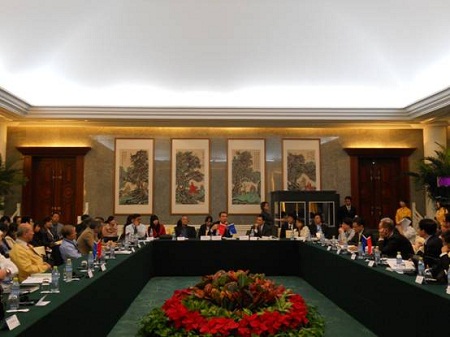Peking University, Nov. 15, 2012: On the afternoon of November 2, the economic panel of Beijing Forum 2012, themed “Rethinking Capitalism in the Post-Crisis World”, was held at Diaoyutai State Guesthouse. Over 30 scholars from the world over including China, India, the US, the UK, Korea and Japan attended the conference.
An economic crisis struck in the fall of 2008, posing a lasting impact on the world’s economy on a global scale. Scholars from different countries all tried to analyze the event and held various opinions in terms of the causes, some of who blamed the crisis on the export-oriented strategy of the East Asian countries and China's trade surplus.
The overall topic of the first section was “Capitalism and the Financial Crisis.”
Justin Yifu Lin, from Peking University, China, delivered a speech entitled “The International Monetary System and the Global Financial Crisis.” In his opinion, the cause of the crisis was the imbalance of the global economy, which resulted from the US dollar being the single international reserve currency. Thus the international monetary system must be reformed. Professor Lin put forward a solution called “Paper Gold.” He explained that the “Paper Gold” is a kind of global reserve currency that is issued by international monetary sovereignty agencies and linked to gold, able to be converted to all national reserve currencies with a different fixed exchange rate respectively. In this way, conflicts between national interests, and the consequence of using a national currency as the global reserve currency, could be avoided.
Vamsi Vakulabharanam from University of Hyderabad, India, made the second speech, the topic of which was “Economic Turbulence in Capitalism: Twentieth Century and Beyond.” He mainly presented us with an idea that there was a strong tie between the domination of financial capital and the conversion of global strength. “We have reached a time with terrible uncertainty.” he said, “Perhaps the US-centric world system will continue; perhaps a new system with the center of China will form; or other possibilities…." As for the issue of China, considering that China’s industrialization process started from labor-intensive industries, which was no different from that of Europe and the US, he proposed that China should break away from this pattern and find its own way out, while expanding its demand and solving such issues as ecological damage and territory disputes at the same time.
Paolo Guerrieri, from University of Rome, Italy, was the third to speak, addressing on “The Long-Run Challenges Facing the World Economy and the Policies for Global Recovery.” He believed that the global economy was already out of balance and the rule of game was changing . The engines of the world’s economic growth were actually developing countries, while the world system led by the US and Europe would be transformed into a multi-polar one.
"The Twin Crisis of Europe and the US: What do They Mean for the Future of Capitalism?” was the topic discussed by Emilio Ocampo, from University of CEMA, Argentina. He presented an idea that the financial crisis and the European debt crisis were unlikely to result in the demise of capitalism. In fact, he believed capitalism was still far better than other existing systems. He took Argentina as an example of observation and came to a conclusion that the existence of capitalism should lie on a sound political basis.
The second section was themed on “Diversity of Capitalism.”
Chunli Li, from Aichi University, Japan, divided all the capitalist economic entities into five categories, namely the neo-liberal model, the social democratic model, the Continental model, the Mediterranean model, and the East Asian model. In his speech “The Diversity of Capitalism and Bureaucratic of Pluralism”, by comparing advantages and disadvantages, he provided us with a comparative macro perspective to rethink the economic governance in the post-crisis era.
Yan Zhijie, from Peking University, China, elaborated in his speech “Reflection on Capitalism: A Lesson of the Crisis” the cause of the financial crisis was lack of effective demands, plus the separation between the real economy and the virtual economy.
Goro Takahashi, from Aichi University, Japan, pointed out in his speech “A Switchover of Surplus Capital Society” that the financial crisis stemmed from excessive money supply which led to over-consuming and ultimately undermined the sustainability of economic development.
"International Monetary System and International Monetary Policy Framework for Emerging Countries” was the last speech of the day, carried out by Kim Soyoung from Seoul National University, Republic Of Korea.
Undeniably, the world's economic center has shifted. Whether capitalism is on its way to death or the “Paper Gold” is the right way out, there’s a lot of room for further discussion.

Reported by: Guo Caichen
Edited by: Zhao Xiaowei, Chen Long